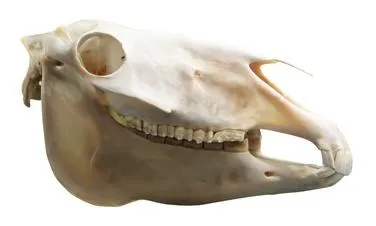Equine Mouth
Equine Mouth
Horses have between 36 and 44 teeth depending on varying factors.
Types of Horse Teeth
Incisors (Front Teeth)
- Every horse should have 12 incisors.
- Used for tearing grass from the ground.
- Erupt as baby teeth (foal), later replaced by adult teeth.
Canines
- Sit between the incisors and molars.
- Typically found in male horses (4 teeth); rare in females.
- Usually erupt between 4–5 years of age.
Wolf Teeth
- Appear just in front of the first molars.
- Not all horses have them; usually 1 or 2 upper ones.
- Erupt by around 18 months of age.
- Sit where the bit rests, often causing discomfort.
- Removal is recommended before starting bitting, done under sedation and veterinary supervision.
Molars (Back Teeth)
- Horses have 24 molars in total.
- The front 12 erupt as baby teeth and are replaced by adult molars.
- Used for grinding food to help with digestion.

Normal chewing involves firstly nipping off grass with the incisors and then passing the food back to cheek teeth with tongue. Horses don’t chew up and down like humans, but in a sideways and circular motion – only 1 side is used per mouthful.
The perfect horse will use both sides evenly, but often horses prefer to chew on one side. This may be due to discomfort on one side or just natural preference, but can lead to dental problems.
Gentle, qualified equine dental care at your yard , improving your horse’s comfort, performance, and wellbeing. Serving owners, riders, and stables across the North with flexible, on-site appointments.

Gentle, qualified equine dental care at your yard — improving your horse’s comfort, performance, and wellbeing. Serving owners, riders, and stables across the North with flexible, on-site appointments.